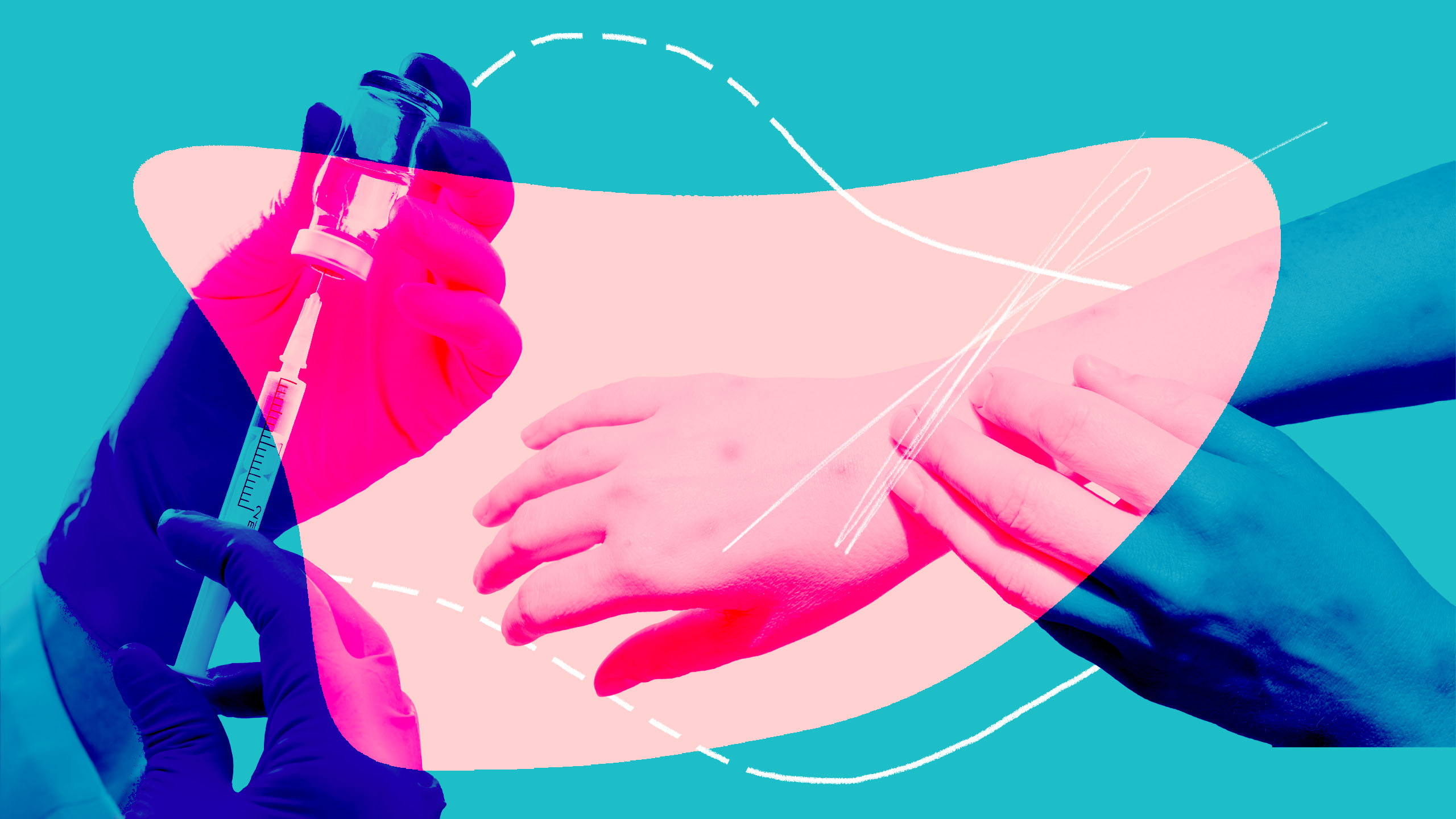Just as we thought we were out of the vaccine-hunting game, many queer men are finding themselves once again jumping between around-the-block lines, social media threads and desperate group chats to access the shots they need.
Such was the case earlier this month in Toronto, as vaccine pop-up clinics for mpox became available for men who have sex with men—a group deemed higher risk based on the demographic of confirmed mpox cases. An infection characterized by skin lesions and flu-like symptoms, mpox is rarely fatal, but symptoms and contagiousness last between two and four weeks, making it difficult to stay home and quarantine as public health agencies are directing. While there’s no mpox vaccine, the smallpox vaccine is at least 85 percent effective in protecting against the virus.
That vaccine’s rollout, however, hasn’t exactly been smooth. Toronto’s queues spanned hundreds of people, with the downtown vaccine clinic at the AIDS Committee of Toronto’s offices running out of doses just 20 minutes after opening. Similar things are happening elsewhere. Some of New York’s mpox vaccine clinics were forced to close following overwhelming demand. When D.C. Health announced 300 available vaccine appointments, all had been claimed less than 15 minutes later.
There’s a few reasons why so many queer men are seeking the vaccine. One is the climbing case count, with more than 235 confirmed cases of mpox in Canada as of June 24. While that’s still a small figure comparative to the general population, the concentration of mpox in the queer community is cause for attention.
All confirmed cases in Ontario, for instance, are among men. While data on sexual orientation isn’t widely available public health officials have been clear: mpox is not a gay virus, but this outbreak is currently predominantly occuring in this community, as it has showed up among men who have attended Pride, and sex-oriented events. LGBTQ2S+ groups have been quick to mobilize, raising awareness around the virus and its symptoms, driving the demand for vaccination up.
Most vaccination campaigns are specifically targeting men who have had multiple partners, visited a sex-oriented venue, had casual anonymous sex or performed sex work in the past 21 days—or plan to do those things. Men who have sex with men who have been diagnosed with chlamydia, gonorrhea or syphilis in the past are also eligible in some areas.
On the mpox vaccine supply, a question mark remains
When global mpox cases were first on the rise, health practitioners were optimistic that unlike the beginning of the COVID pandemic—in which no vaccine initially existed—mpox transmission could be deterred with the more widely available smallpox vaccine.
While that’s still mostly true, the World Health Organization’s June 14 interim guidance on vaccinations for mpox notably advised that supplies of older smallpox vaccines are “not recommended for mpox at this time, as they do not meet current safety and manufacturing standards.” That same week, Canada’s National Advisory Committee on Immunization released its own interim guidance on using only the Imvamune vaccine, a third-generation smallpox vaccine originally released in 2013, in the context of mpox outbreaks—which is the vaccine being given at pop-up clinics.
But it remains unclear how much Imvamune Canada has. In May, Dr. Theresa Tam, Canada’s chief public health officer, cited “security concerns” as the reason for not sharing information about the nation’s supply. Requests from Xtra to the federal and Ontario ministries of health on the latest status of Canada’s Imvamune supply have also gone unanswered.
Context clues suggest Ontario’s supply, at least, isn’t surging. Late last week, Ottawa public health tweeted that Ontario’s Ministry of Health provided the local agency with only “a very limited supply of vaccines.” As such, they’ve focused their efforts on directly contacting highest priority people for vaccinations.
Though a Toronto Public Health spokesperson wouldn’t comment on the city’s remaining supply following this weekend blitz, an off-the-record contact suggested the agency has about 5,500 doses remaining as of last week.
Since Imvamune is a two-dose vaccine, everyone receiving a shot should be getting a follow-up shot at least 28 days after the first. Yet vaccine clinics are not scheduling follow-up shots, instead handing out paper vaccine certificates that said, in part, “you may need a second dose. More information on second doses for select high-risk groups will be provided in the near future.” Community organizers are hoping for more transparency about the supply.
“We’re very encouraged to see the vaccine being rolled out in Montreal, Toronto and Ottawa, but there are a lot of questions in terms of how much supply there actually is,” says Michael Kwag, knowledge exchange and policy development director at the Community-Based Research Centre (CBRC). “We want governments to be a little bit more transparent in terms of what they’re dealing with in terms of supply and engage the community in the overall strategy development.”
Some community groups are hoping to broaden the eligibility for vaccine walk-in clinics, which right now are focused on gay, bi and queer men who are sexually active, despite mpox not being defined as a sexually transmitted infection. Having more information about vaccine supply could help community groups answer questions on when the vaccine might become available to other groups, says Kwag.
“This is an urgent public health threat,” says Kwag. “Now that we’re in Pride season, we know this community of gay, bi, queer men is a highly interconnected and mobile population, with travel taking place between different cities for Pride. We need to be more proactive with vaccinations and information.”
Evolving vaccination strategies signals greater urgency
Outside of hotspots in Quebec and Ontario, health agencies are taking a more reserved approach to vaccination.
British Columbia, for instance, is still employing a “ring” strategy: vaccinating close contacts of people with confirmed infections, thus creating a “ring” of protection around someone who has mpox. Yet local B.C. organizers aren’t naive about the likelihood of what’s happening in Eastern Canada making its way west, and anticipate vaccination clinics to begin when enough local mpox cases warrant them.
“We’re getting ready if and when the policy changes,” says Aaron Purdie, executive director at the Vancouver-based Health Initiative for Men (HIM). Purdie and his network are taking lessons from Montreal and Toronto when it comes to mpox mitigations, including trying to get information and vaccines into bathhouses and sex parties earlier, and getting creative with messaging that isn’t stigmatizing or alarmist.
“We’re looking east at what’s happening and through our networks of gay men’s health organizations, we’re seeing a very quick transfer of knowledge that will serve the west coast quite well,” he says.
Likewise, local groups are attempting to be more aware of how mpox information is being shared and who might be getting left out. The Toronto-area Asian Community AIDS Services (ACAS), for instance, is translating mpox messaging into Simplified Chinese, Vietnamese and Tagalog. ACAS is also partnering with local health agencies to offer their own mpox vaccine clinic.
“We know a lot of gay men spend time downtown, but to have further reach is always helpful, especially for East and Southeast Asian folks who live in Markham, Scarborough or North York areas,” says Ryan Tran, ACAS’s manager of education and outreach. Tran is also working to set their clinic up on an appointment basis, as walk-ins have unpredictable wait times that many people can’t accommodate.
Community groups make collective ask for mpox-related aid
CBRC, HIM and ABAC are also among the 48 signatories of an early-June letter that went to the heads of several federal portfolios—including health, finance and labour—calling for government aid in two main areas: financial assistance programs for anyone who would have to self-isolate potentially for weeks following a mpox diagnosis—which do not currently exist—as well as funding for community-based organizations and services who are creating new supports related to mpox. These groups have yet to receive a formal response to that letter. When it comes to a virus’s spread, however, timing is crucial.
“It’s about making sure we’re not turning a blind eye to people who are told they have to isolate because they have mpox, but who don’t have the ability to be off work for weeks,” says Kwag. “There are lots of gaps in terms of paid sick leave and we’re living in an affordability crisis. That’s a reality that really needs to be appreciated by government, especially so they can provide the supports.”


 Why you can trust Xtra
Why you can trust Xtra


